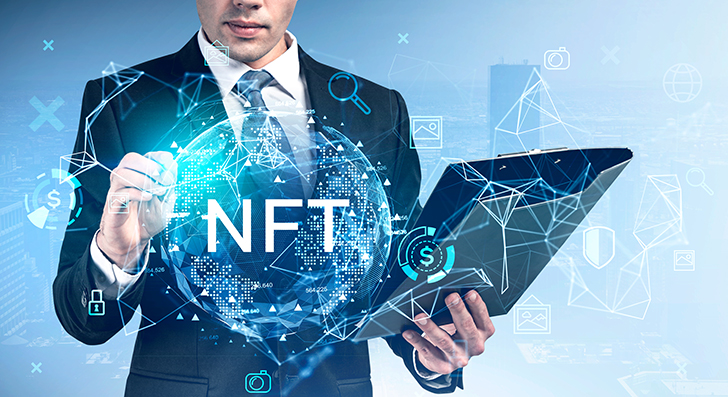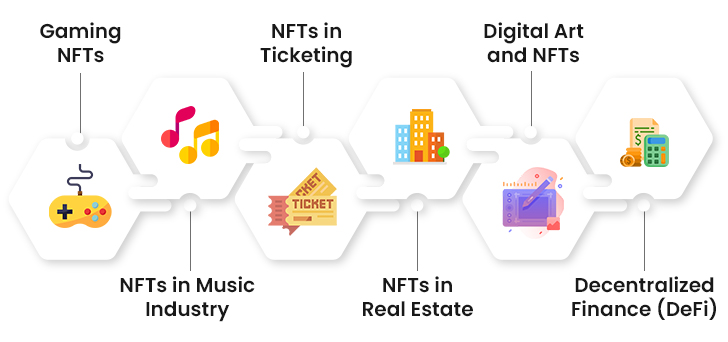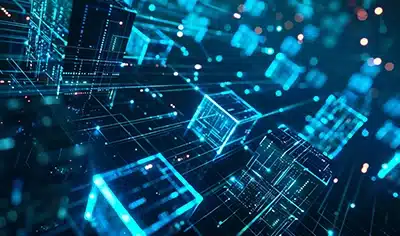There is no denying that the NFT space is undergoing a major upheaval, owing to the recent FTX crash. With that said, NFT still remains a viable asset. Its adoption continues to grow as multinational corporations and conglomerates discover new ways to incorporate NFTs into their business models.
From the likes of Meta and Reddit to Twitter and Visa, all have been working on NFT projects. New NFT startups are coming up every now and then. In light of these developments, it is believed that the global NFT market will reach $231 billion by 2030.
So what does the future of NFTs look like? And what new NFT trends can we expect in days to come?
Notable NFT Trends for 2024
1. Gaming NFTs
Online gamers spend several hours accumulating in-game assets such as swords or coins. But in traditional games, gamers are usually unable to monetize their efforts. Thanks to NFT-based games such as Axie Infinity and Spliterlands, players can now own and trade virtual assets. Items earned or bought during a game can be stored in a user’s wallet and traded for real money in secondary markets. Such play-to-earn (P2E) models are not only helping players make serious profits but also creating additional revenue streams for game developers.
2. NFTs in Music Industry
For musicians struggling to get fair compensation for their work, NFTs could offer a much-needed respite. Currently, most artists rely on streaming services and music labels to generate income. When artists are allowed to sell their pieces as NFTs to fans, they can not only earn huge profits but also have greater control over how their music is priced and distributed. This means their content cannot be easily distributed without copyright. Besides, this would also open avenues for artists to sell their pieces as exclusive bundles or limited editions.
The music NFT industry is already booming-it is expected to touch $80 billion by 2025. In the coming year, we are likely to witness an increasing number of marketplaces selling music NFTs in partnership with musicians.
3. NFTs in Ticketing
NFTs have also been introduced into the domain of ticketing. By creating and selling tickets as NFTs, event organizers can verify ownership without the need for a third-party platform. Plus, they can have better control over the resale market, as NFT-based ticketing would minimize the impact of fraudulent practices such as ticket scalping that have plagued the ticketing industry for a long time.
NFT-based ticketing is likely to witness a massive adoption in the next few years, as it would offer tremendous value to the audience. The latter would not only get exclusive access to a live event but also earn a personal digital asset.
Several entities are already using NFT-based ticketing to provide the audience with lifetime value and special incentives. For instance, WarnerMedia’s DC Comics recently offered comic book-inspired NFTs for free to users who had registered for their virtual fan event, DC FanDome.
4. NFTs in Real Estate
Long-term investment in real estate is considered challenging as it involves a lot of cumbersome paperwork and other formalities. NFTs could help resolve such issues as documents validating ownership of a property can be stored on the Blockchain as digital tokens, and transferred the way cryptocurrencies are traded.
Decentralized real estate is a popular NFT business model that Blockchain and NFTs could bring many advantages to, as it would boost the safety of information. It would enable buyers and sellers to easily verify and transfer asset ownership, make documents tamper-proof, and boost transparency in the entire ecosystem. While NFTs in real estate is a relatively new phenomenon, it will likely pick up soon after acceptance from the concerned authorities.
5. Digital Art and NFTs
With the growing popularity of digital art, the number of artists creating digital work has gone up, and so has the number of marketplaces buying and selling digital art. As NFTs continue to make their way into the art industry, artists are setting up online shops where users can buy or commission artworks.
NFT-based digital art provides opportunities for artists to gain recognition for their work and leverage their skills to make money while bypassing the middleman. Plus, artists have struggled to verify the ownership of their pieces, and NFT helps tackle exactly that. With Blockchain at its core, it is extremely easy to establish provenance with digital tokens.
No wonder, some of the most popular NFTs so far have been digital artworks. For instance, digital artist Pak’s creation, The Marge, was recently sold for a whopping $91.8 million.
6. Decentralized Finance (DeFi)
The scope of decentralized finance (DeFi) has widened to include NFTs, as users have started accepting NFTs as collaterals for crypto loans. People are leveraging their NFT collections to receive credit for funding investment opportunities or in case of force majeure.
Of late, several DeFi platforms that allow lending through NFTs have been launched. For instance, Arcade is a decentralized marketplace where loans are offered against a borrower’s NFT collection. These NFTs are closed till the loan is repaid entirely or the borrower defaults. NFT-Fi is another platform that allows NFTs to be pledged as collaterals. The service issues loans in ETH and uses ERC-721 tokens as collateral.
Learn How a Blockchain-Based Software Provider Grew Customer Base With a Robust NFT Marketplace
Proven Techniques for Developing a Custom NFT Marketplace
With the meteoric rise of NFTs, the demand for NFT marketplace development has surged, presenting a lucrative opportunity for entrepreneurs and businesses alike. Developing a custom NFT marketplace requires a strategic approach encompassing design, functionality, security, and promotion. Let’s look at some of the reliable techniques for crafting a successful custom NFT marketplace:
I. Design and Implement the UI
The user interface serves as the gateway to an NFT marketplace, shaping users’ perceptions and experiences. A visually appealing and intuitive UI is paramount to attract and engage users. When designing the UI, prioritize simplicity and functionality, ensuring seamless navigation and easy access to essential features.
Utilize modern design principles and responsive layouts to cater to users across various devices. Implement features such as customizable profiles, search filters, and personalized recommendations to enhance user engagement. Furthermore, incorporate interactive elements and visually captivating displays to showcase NFT collections effectively.
II. Build a System for Uploading and Organizing NFTs
Efficiently managing and organizing NFTs is crucial for a seamless user experience. Develop a robust system for artists, creators, and collectors to upload, mint, and organize their NFTs effortlessly. Provide users with intuitive tools to categorize, tag, and describe their creations, facilitating easier discovery and showcasing of their work.
Implement features such as batch uploading, metadata editing, and preview options to streamline the NFT creation process. Additionally, integrate support for various file formats and metadata standards to accommodate diverse types of digital assets.
III. Payment Portal Integration for Crypto Transactions
Seamless integration of payment portals is essential for facilitating crypto transactions within an NFT marketplace. Support for multiple cryptocurrencies, including Ethereum and other popular tokens, enhances accessibility and flexibility for users.
Integrate secure payment gateways with robust encryption protocols to safeguard transactions and protect users’ financial data. Implement features such as escrow services and smart contracts to ensure trust and transparency in transactions. Additionally, enterprises can provide users with comprehensive transaction histories and real-time notifications to track their purchases and sales effectively.
IV. Ensure Security and Reliability
Maintaining fail-proof security in the NFT marketplaces is highly crucial, where valuable digital assets are exchanged. Implement stringent security measures to safeguard users’ accounts, personal information, and digital assets from potential threats and vulnerabilities.
Utilize industry-standard encryption protocols and multi-factor authentication mechanisms to fortify the platform against unauthorized access and data breaches. With the help of a recognized NFT marketplace development services provider, enterprises can conduct regular security audits to identify and address any vulnerabilities promptly. Moreover, implement robust dispute resolution mechanisms and customer support channels to address users’ concerns and mitigate potential disputes effectively.
V. Promote the NFT Marketplace
Effective promotion is essential to drive traffic and foster growth for the custom NFT marketplace. Enterprises should follow a multi-faceted marketing strategy including social media, influencer collaborations, and community engagement initiatives to drive marketplace presence.
Harness the power of social media platforms such as Twitter, Instagram, and TikTok to create a buzz around the NFT marketplace and reach a broader audience. Collaborate with prominent influencers, artists, and creators to showcase the features and endorse the platform. Additionally, produce engaging content such as blog posts, videos, and tutorials to educate and attract the audience.
Final Thoughts
Notwithstanding the fact that NFT is still in its infancy, the technology offers tremendous potential. From revolutionizing the events industry to opening avenues for artists and musicians to sell their creations, NFTs are set to change how we interact with different industries. As an integral component of Web 3.0, NFTs are here to stay and poised to grow rapidly in the days to come.
A Blockchain development specialist, Damco builds profitable, scalable, and robust marketplaces to help enterprises meet all their NFT-related needs. Explore our NFT development offerings to understand which one of these would be the best suited for your business.







